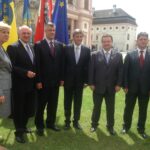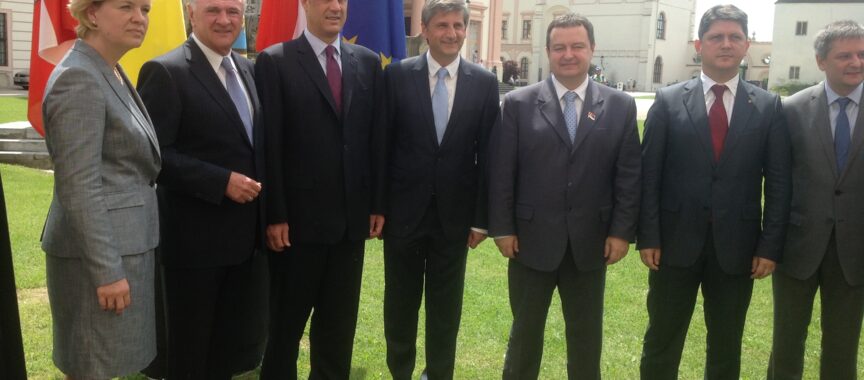WACHAU, 16 June
The Prime Minister of the Republic of Kosovo, Hashim Thaçi participated in the Conference of the European Forum Wachau.
In today’s session, speeches were given by Erwin Proll, governor of Lower Austria, Titus Corlatean, Foreign Minister of Romania, Nikola Poposki, Foreign Minister of Macedonia, Hashim Thaçi, Prime Minister of the Republic of Kosovo, Ivica Dacic, Prime Minister of Serbia and Michael Spindelegger, Vice Chancellor and Federal Minister of European and International Affairs.
The conference was held at the Abbey of Wachau.
The following is the full speech given by Prime Minister Thaçi.
Honorable guests,
Ladies and gentlemen,
It is a great pleasure for me to participate in the European Forum Wachau and on this occasion, I would like to express my most sincere thanks to the organizers of the forum, starting with Ms. Barbara Schwarz, Mr. Michael Spindelegger the chair, Governor Erwin Peroll and everyone else.
I think that a positive momentum exists in Europe to overcome crises, or perhaps it is more appropriate to say remaining challenges, so that we can definitively conclude together the framework or platform of the new Europe, which must be a united, integrated, economically developed Europe with a decisive role in the world arena.
Today, together with my counterpart from Serbia, Prime Minister Dacic, I would like to share with you an extraordinary and fresh experience, the experience of how peoples who have been in conflict for centuries on end can leave behind them the bitter legacy of conflict and build peace and normal relations, to ensure that there is no opportunity left open ever again for bloody wars.
Today, it is my pleasure to share with you the most difficult experience of overcoming the crisis, a deep and bloody century long conflict, between Kosovo and Serbia, with successfully ended on April 19, 2013, in Brussels.
Allow me to turn back, not to 1389 as is usual in the Balkans, and nor to the history of the former Yugoslav wars.
Kosovo declared its independence in 2008, after an intensive period of negotiations, led by the UN Representative, Marti Ahtisaari.
The recipe used by President Ahtisaari was a deep compromise between the two parties:
A conditional independence was proposed, according to which Kosovo might declare independence, but would not win full rights and full sovereignty in decision-making, until it had implemented deep reforms, including decentralization, as a concept of bringing government closer to the people through municipalities.
This was a way of protecting and affirming the Serb minority and others from the majority or from discrimination.
Over 60 different competences were transferred to municipalities, and meanwhile, some new Serb majority municipalities were created.
Although accepted by an absolute majority of states in the Contact Group, including Russia, this plan was not accepted by Serbia and the northern part of Kosovo, which has been illegally controlled by Serbia’s Government and its parallel structures, since the end of the war in 1999.
Kosovo is committed to building institutions and to seeking recognition, and I am happy to inform you that now a majority of UN states have recognized Kosovo.
Kosovo has become a member of international organizations: the International Monetary Fund, the World Bank and most recently, the European Bank for Reconstruction and Development.
Due to lack of border control in the north, according to the research of the Serb media and civil society and to UN data, organized crime and smuggling has led to profits of 60 million Euros for illegal structures.
At the Thessaloniki Summit, a decade ago, the EU made a big promise to the entire Balkans that it would join the EU, after implementing reforms.
But internal reforms within states were not the only condition for those aspiring to join the EU.
Another key criterion was overcoming inter-state problems, thus good neighborliness between the potential candidate countries for EU membership.
Initially, dialogue was technical and we agreed with Serbia that it would not boycott Kosovo in regional organizations, that Kosovo’s diplomats would be recognized, that Kosovo’s cadastral records would be returned, and that Serbia would no longer issue car registration plates etc.
Despite these agreements reached, it was clear that in Serbia there was still a limit to coming to terms with reality.
In many respects, the key chapters remain open, especially Serbia’s acceptance that in Kosovo there is only the law of Kosovo, that there is no constitutional ambiguity about who is in charge in Kosovo in terms of democracy and sovereignty.
With Baroness Ashton and the EU, the two prime ministers of the states agreed to start meetings, to enter more deeply into obligations and bring about a true normalization of the situation.
We created a new situation and landscape where the two parties truly started to write a new chapter of history, without hostility and within the Euro-Atlantic agenda.
We have met 11 times and together we have spoken for 200 hours.
We entered into intensive, responsible dialogue, which was often frustrating, often prejudiced, often with deep disagreements, but dedicated to not leaving without reaching an initial framework agreement on the principles of normalization, which address key issues.
Baroness Ashton played an admirable role with her patience, commitment and political vision.
I can say that after these exhausting discussions, we achieved a historic success.
The agreement in essence is simple.
Serbia accepts Kosovo as it is, it recognizes its laws, its Constitution, it does not threaten its sovereignty and it entirely withdraws from maintaining and financing illegal security structures in Kosovo.
In addition, Serbia pledges according to the Agreement that it will not block Kosovo in its European integration.
Meanwhile, Kosovo promises that it will strongly guarantee the implementation of the Brussels Agreement in the entire territory, providing additional guarantees and instruments, in alignment with our Constitution, for Serbs who live in the north of Kosovo.
We have ensured that Serbs in the north can link municipalities in an association that will deal with local self-government as well as being an important mechanism for Serbs in Kosovo, where they can address their concerns and affairs.
The agreement will be reflected in many areas.
In energy, we must have a single transmission system, in line with European charters.
With regard to freedom of movement, we must take care to have an integrated border management, to stop crime.
In multi-lateral interactions, we must take care that Kosovo becomes a member of all organizations that enter under the European integration umbrella.
It is important that we agreed to open Liaison Offices in our capitals.
After reaching this historic agreement, we have still held meetings on how to implement the agreement.
What are the first steps that must be undertaken, and what are the second?
How to ensure that there is no security vacuum in the north?
How to create democratic representation and hold elections according to the law in Kosovo?
Ladies and gentlemen,
There are three types of challenge ahead of us:
The first challenge
This is the inertia of the old system and old concepts in Serbia.
It is clear that this agreement is historic, but it is also clear that it requires root change to its paradigm and position toward Kosovo.
In Belgrade, Kosovo must be seen as a partner and not as an enemy or province from post-Ottoman times past.
And Kosovo must not view Serbia through the lens of the period between 1913 -1999.
There is still enough power in Serbia and in Kosovo to obstruct and slow down a reconciliation process.
We saw this with the failure of the Macedonia summit. I hope that this obstruction will be discussed and clarified.
The second challenge
The Serb population in the north, according to polls, is in favor of normalization and wants to move forward. We have evidence for this with our office in the north, which serves thousands of Serb civilians, but there are still radical elements who try to blackmail people.
I strongly believe that democratic elections in the local and parliamentary system will resolve a large part of this problem.
We will declare an amnesty, so that those who recognize Kosovo’s constitution and laws will feel secure.
But, on the other hand, we must make it clear to criminals that they will not find freedom or space anywhere, neither in Kosovo, nor in Serbia.
Third challenge
European enlargement fatigue is an external factor that may cause concern.
EU countries have been decisive in contributing to peace, freedom and stability in the Balkans, but times have changed and it is a stressful time for the internal political landscape of these countries.
This creates obligations especially for Kosovo, as the latest state to start formal European integration, to implement reforms and take concrete steps to align our country with the EU.
But, in some states there is still prejudice that the Balkans only brings problems.
This is not true.
Kosovo has a lot to offer Europe.
Ladies and gentlemen,
I am convinced that last month we witnessed a true turning point.
As Prime Minister of Kosovo, on behalf of the people of Kosovo, I have shown that we are ready to move forward and to open up a new chapter – that of peace and reciprocal cooperation.
Our peoples have suffered much in the past and expect this from their leaders today. Our children will curse us should we leave an open conflict for their generation.
In the end, normalization leads to the most complete form of justice possible, the finalization of the political conflictual map of the Balkans once and for all, and the creation of good neighborliness, as EU candidate countries.
Last modified: July 31, 2022


